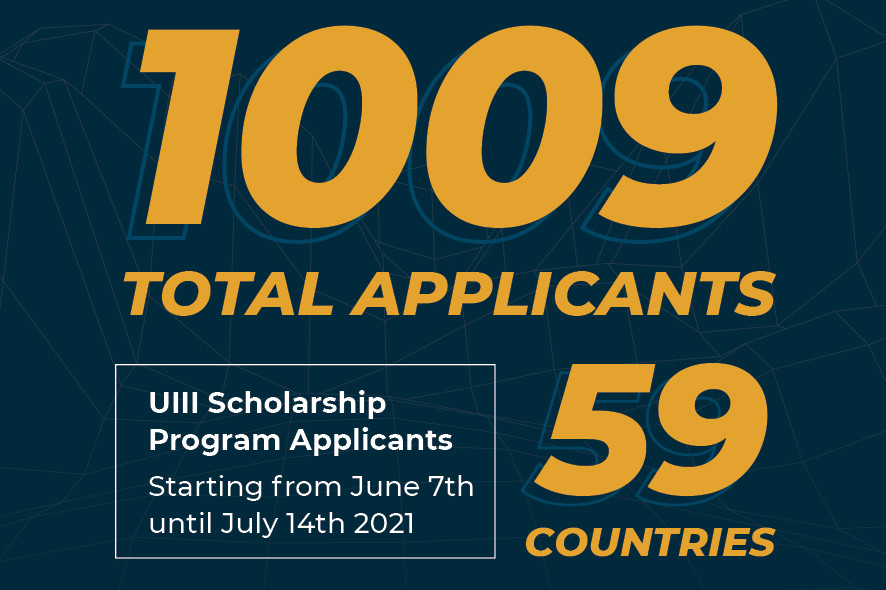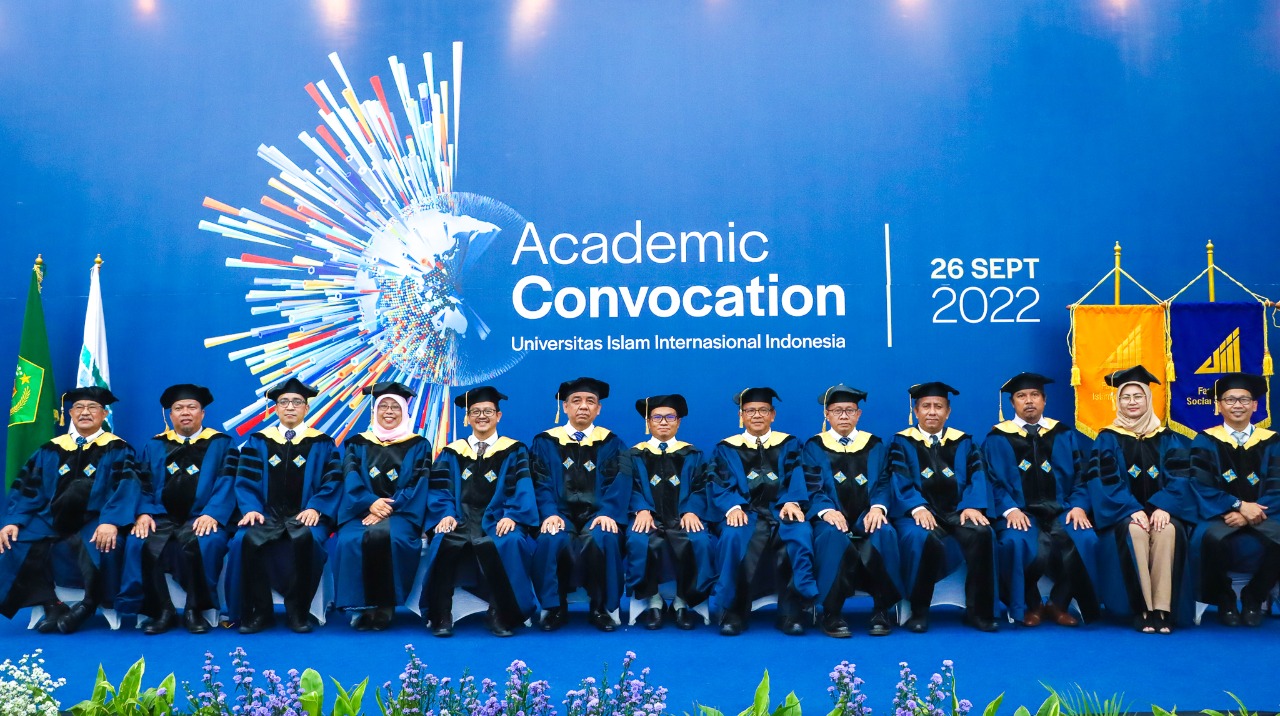Editorial: Why Scholarships Matter
June 16, 2021
If nothing goes wrong, next September the Indonesian International Islamic University will kick off its semester and new academic activities. For the 2021/2022 academic year, UIII has only accepted prospective students applying for their Master's degree programs. Meanwhile, the acceptance of prospective students for the doctoral level which was originally planned to be made in the same package with the Master level will only start next year, mostly, due to several technical matters. Various preparations have been made to continue to smooth the plan and simplify the process.
On Monday, June 7th 2021, UIII officially opened the registration of promising new students for the Master's degree programs which can be followed by applicants from within and outside the country. The announcement, which was delivered through a press conference at the Student Residence Hall, officially launched a full scholarship program for applicants who successfully passed the selection. Not only that, through this scholarship program, the successful students will also be placed in student dormitories and receive a reasonable amount of allowance.
For its opening year, UIII starts with 4 (four) faculties, namely the Faculty of Islamic Studies, the Faculty of Social Sciences, the Faculty of Economics and Business, and the Faculty of Education. The study programs in each faculty will be instructed in English, although Arabic language is required exclusively for those students admitted in the Faculty of Islamic Studies. Meanwhile, students who study, conduct research for thesis and dissertations on Indonesia and Southeast Asia are required to master the Indonesian language.
Although the UIII campus bears the name of Islam, the applicants are not limited only to Muslims but also to non-Muslims. UIII adheres to the principles of non-discrimination and non-sectarianism. This principle also applies to gender and regional categories, and encourages groups with disabilities to take part in the UIII scholarship programs. All buildings and dormitories at UIII have been designed to be more accessible and disabled friendly.
UIII is the first campus in Indonesia to open Master’s and Doctoral programs with full scholarships, inviting international students. After 76 years of independence, it feels like it's time for our nation to give more and start the tradition of giving scholarships to international students. Not only to foster and strengthen friendships with recipient countries, but we are also obliged to actively participate in supporting education at the global level.
If we do a little comparison, relatively African countries such as Sudan, Morocco, Algeria, etc., have been actively providing scholarships to international students, including those from Indonesia. Thus, we actually have no reason to not do the same.
In Indonesia, education is still an expensive expenditure, especially for higher education. Nevertheless, that is not an excuse to deny the fact that the world is filled with the disadvantage of poverty, where poor and neglected children cannot afford to go to school. Are we going to continue to be preoccupied with our own affairs without caring about others? We know that those small countries mentioned above are not without problems associated with poverty and underdevelopment. Yet they remain active in supporting the education of children around the world. They confidently invite children from all over the world to study in their country with scholarships.
Many Indonesian children have also benefited from scholarship programs from other countries. After returning from those countries, they have an emotional bond and love for the country where they have studied and pursued their academic degree through scholarships. Indirectly, they are the ambassadors of the country who introduce the uniqueness and cultural richness of each country. They bring the relations of each country closer through a humanist and cultural approach. This is a long-term investment for world peace. We, as a nation, must actively participate in fighting for it because it is a constitutional mandate, namely the Preamble of the 4th Paragraph of the 1945 Constitution of the Republic of Indonesia.
UIII ensures that we don't need to delay any more time to do the same thing. We are ready and able to do so because we have sufficient resources. Our nation is a big nation, and we must think big. If we are proud of rich culture and heritage, with the religious life of a peaceful and tolerant society, how else can we introduce all of this to the international world — if not by inviting them to come here to see and experience for themselves?
The scholarship recipients will become the delegates of international relations and cultural ambassadors who will introduce our country to their countries of origin. This must be done continuously, because if not, the name of Indonesia will disappear from the discussion. In the past, the name of Indonesia was so fragrant and famous throughout due to the greatness of Soekarno, one of Indonesia’s founding fathers and a brave revolutionary leader. Recently, the world community is more familiar with Bali than Indonesia because of its incomparable tourism charm and its culture that is open and friendly to foreign visitors without losing their identity. We often hear jokes abroad when people ask, "Where is Indonesia? Is it located … next to Bali?"
In the future, if we are not actively and continually introducing Indonesia, don’t be surprised if Indonesia will no longer be relevant. In this context, with the international scholarship program, we will put the name of Indonesia in the heads of young people who will take it to the global arena. Although this step is actually quite late, we still have to start from now, without hesitation.
It is interesting that the word "scholarship” in English has two different meanings, one being "grant" and the other being "bachelorship." How can these two meanings be summed up in one word, if not for their close relationship? This means that in its history, bachelorship has always been related to scholarships. A person cannot be required to study systematically with full concentration if at the same time he must also think about the costs. Especially if he or she also has to bear the family's daily expenses. The result will not be optimal, because his or her mind is not focused. If you want maximum results, a prospective scholar must be freed from the burdens of daily life. This means that someone must be given a full scholarship so that all his energy and thoughts are only devoted to the success of his studies.
This is the secret of developed countries that properly finance the cost of education for their children. They reap quality results. Meanwhile, in underdeveloped countries, education becomes an expensive item so it cannot be bought. On the other hand, it is also common knowledge that education is a lucrative business field. Schools and universities are places where conglomerates and the haves put their shares with promising profit calculations. Education was controlled and managed more by businesses-minded circles. They only accept the children of the rich, meanwhile, the children of the poor are left out of school.
Many countries, unfortunately, are still in this category. That's why we need to work more to accelerate the progress of our education programs. UIII is determined to start the tradition of providing scholarships so that more people will have the opportunity to study in higher education. There is nothing wrong with us imitating the way countries have done it before, and it has been proven that they are capable of producing superior humans. We don't need to be overly ambitious, but it is good to remain optimistic that one day we will get there. (ag)
- Call for Papers 2025: FEB UIII Invites Researchers to Explore Muslim World Economy & Sustainability in OIC Countries
- Prof. Dr. Nasaruddin Umar: A Distinguished Profile in Religious Leadership
- Is Indonesia’s Middle Class Collapsing?
- Pedaling to Work, Dr. Lukman’s Message on ‘World Sustainable Transport Day’
- Welcoming the Pilgrim of Hope: Indonesian Muslim Leaders Embrace Pope Francis
- Sheikh Muhammad adh-Dhuwaini: A Recognized Authority in Sharia and Law
- Qurban and Grassroots Innovations Across Indonesia
- Indonesia's Green Qurban Movement
- UIII Productivity Ratio 2023
- Unsung Heroes in Global Trade: Celebrating International Customs Day 2024


